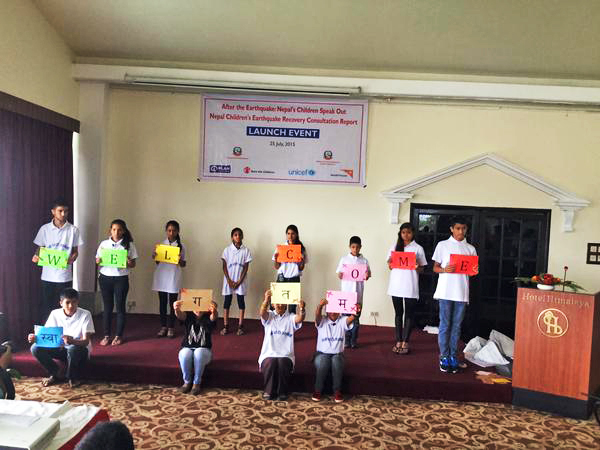After quake, children’s top priorities are shelter, education and WASH
KATHMADNU, July 25
In one of the largest ever children consultations undertaken following the disaster, nearly 2,000 children who survived the earthquakes in Nepal have expressed fear and insecurity at having to live in tents and overcrowded shelters.
The aid organisations that carried out the consultations — Plan International, Save the Children, UNICEF and World Vision — highlighted the need to strengthen the resilience of communities against major disasters amid a programm organised in Lalitpur on Saturday. They also warned of severe risks to children’s health, well-being and protection during the monsoon season.
In the research report ‘After the Earthquake: Nepal’s Children Speak Out’ released on Saturday, children shared their top priorities for shelter, education, water, sanitation and health care. The report reveals the deep fears and anxieties of quake survived children.
Our shelter is at high risk of heavy storms. We were forced to stay awake for a whole night holding on to the tarpaulins to stop them from blowing away
“Our shelter is at high risk of heavy storms. We were forced to stay awake for a whole night holding on to the tarpaulins to stop them from blowing away,” said a young boy in Nuwakot, one of the 14 most affected districts where children were consulted.
Save the Children’s Humanitarian Adviser Lucia Withers said: “Tens of thousands of children are living in inadequate shelters. Despite efforts to help earthquake-affected communities, it is still a race against time to provide basic needs of shelter, sanitation and protection.”
Children expressed concern about the lack of privacy and space, with some younger children fearing attacks of wild animals. Girls in particular reported feeling vulnerable in shelters shared with extended families and neighbors, while others felt subjected to sexual harassment and feared an increase in trafficking.
World Vision’s Nepal Earthquake Response Operations Manager Admir Bajrami said, “With the monsoon season intensifying, we must act quickly and effectively to ensure the welfare of earthquake-affected children and their families is addressed. Children have lived through a hugely distressing experience which has also disrupted their education and they urgently need psychosocial support to recover.” Children who took part in the consultation provided detailed and practical recommendations on how to rebuild their lives and communities, including the need for earthquake-resistant homes, schools and other buildings. Children also want to be better prepared for future earthquakes.
Children suggested that schools be run in tents or other temporary shelters until new schools have been built and called upon the government to replace the books, stationery and other school materials that were buried under the rubble of their homes.
Plan International’s Head of Disaster Preparedness and Response Unni Krishnan said: “Children’s lives in earthquake-affected areas have been turned upside down. The world must wake up to the fact that it is absolutely critical that children are factored in for any disaster preparedness and response efforts to be successful.”
UNICEF Deputy Representative Rownak Khan said: “These children have provided us with valuable insights that could have been missed by adult eyes. These suggestions now need to guide our programmes in the rest of the country, to better prepare all communities in Nepal for impending disasters.”






